Applications to schools amount to a ‘small miracle’
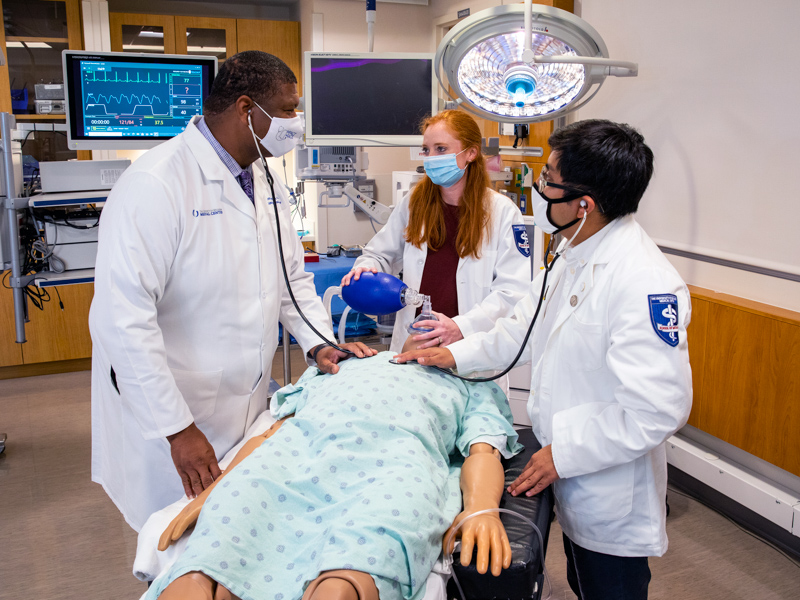
Judging from the number of applications to the schools of nursing and medicine at the Medical Center, many future nurses and physicians enjoy a certain immunity to COVID-19.
As the pandemic grew, they developed a remarkable resistance to some of its worst consequences: fear, doubt and despair.
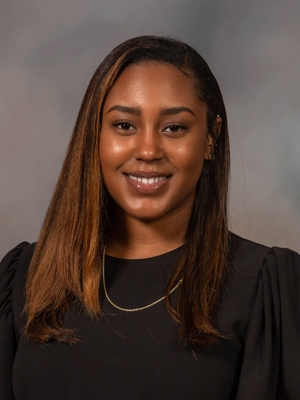
“The pandemic did not make me change my mind about becoming a nurse, and, if anything, it probably encouraged me,” said first-year nursing student Tanzi McAllister of Aberdeen, who applied in the fall of 2020. “I realized somebody still has to be a nurse.”
First-year medical student Donaldo Martinez of Laurel saw first-hand how the pandemic affected patients before he was accepted to the School of Medicine. “Especially those patients who were really sick,” he said. “That pushed me to go through with this and finish it.”
While applications to the medical school dropped slightly, 0.05 percent, from pre-pandemic 2019 to inter-pandemic 2020, they shot up by about 10 percent between the COVID years of 2020 and 2021. In the School of Nursing, applications between 2019 and 2020 climbed more than 6 percent, to 1,191.
The number of nursing school applications did fall between 2020 and 2021, but the average for those two years is 2.4 percent greater than 2019’s total.
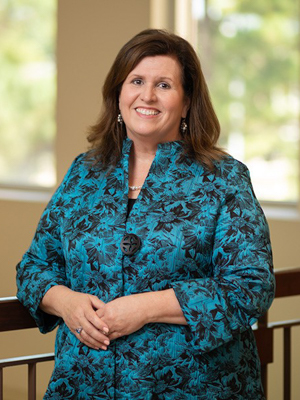
“Our undergraduate applications weren’t down, except in one track, the RN-BSN Program,” said Dr. Julie Sanford, dean of the School of Nursing. “Otherwise, we have had more applicants, and have enrolled more, in two programs: the Traditional BSN Program and in the Accelerated BSN Program.
A senior in the Traditional BSN program, Abbey Climer of Batesville set her heart on a nursing career after being injured in a car accident following her freshman year of college.
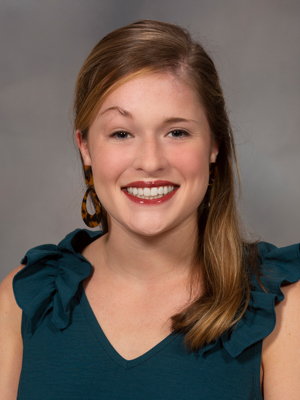
“After being in the hospital, I saw how important nurses are. They made me feel special, and I knew I wanted to care for others in that same way.”
In the spring of 2020, right after being accepted to the nursing program, Climer was about to go to Jackson to have her photo made for her school ID badge; it was at the onset of the pandemic. People were getting sick; classes at Ole Miss and Jackson were moving online, but she did not turn back.
“All that made me want to be a nurse even more,” she said. “By the end of this summer the pandemic started getting worse and I saw how the nurses cared for their patients and kept going; but they’re tired, they need extra help. I feel like this is where I need to be.”
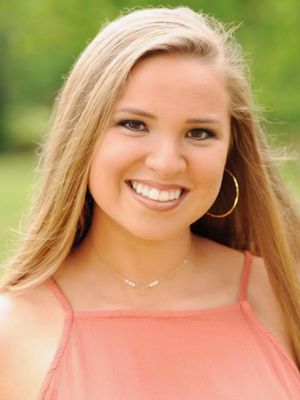
Her classmate, Alexandra Barlow of Ridgeland, worked this summer in the cardiac ICU at the Medical Center. “It was remarkable to see,” she said. “I got to watch all these nurses do whatever they could to save these patients. They are exhausted, but they always put the patient before themselves.
“When the pandemic started, I was kind of nervous; but in life, there is always going to be another barrier or mountain to climb. But our faculty are wonderful. They want us to succeed at everything we do. I wish more people knew how wonderful UMMC is, especially the School of Nursing.”
In spite of “a difficult time,” it was people like Barlow and Climer who are part of the reason most of the school’s nursing programs saw interest go up, not down, Sanford said. “But I wasn’t particularly surprised. Whenever there is a national crisis like this, and even during an economic one, nursing enrollment goes up.
“People realize that this profession has job security, and we’re talking about people who like helping folks anyway; when they look for a career, many think of nursing.”
And many think of medical school. For the School of Medicine, 453 prospects applied for the current M-1 class, the Class of 2025. That is the most ever for the school, said Dr. Demondes Haynes, professor of medicine, pulmonary and critical care, and associate dean for admissions.
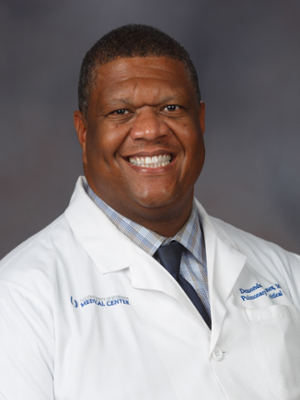
“Some people call it the Fauci Effect,” Haynes said, raising the example of difference-makers in public health, including Dr. Anthony Fauci, director of the National Institute of Allergy and Infectious Diseases.
“Applications vary a little every year,” Haynes said. In fact, they fell slightly (from 446 to 434) between the pre-COVID years of 2018 and 2019. Dr. Fauci notwithstanding, Haynes believes the applications will return to an average number this year.
“I thought the pandemic would scare people away. The fact that the number didn’t fall [from 2020 to 2021], and even went up, demonstrates that these students really want to commit to a life of service. When they applied, quite a few described how the pandemic had affected them and their family.”
Some have lost both of their parents to the virus, said Dr. Loretta Jackson-Williams, professor of emergency medicine and vice dean for medical education.
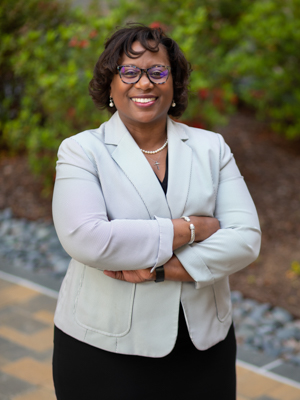
“There are also students with children; when schools went online, all of a sudden they’re in a virtual fest at home. And how, then, do you manage child care while trying to get your own education at home when your classes are online, too?
“I also thought we would have a decrease. The fact that we didn’t speaks to the resiliency of people; many have somehow managed to get through this. That is the small miracle we have seen in the numbers. Because it could have easily not been this way.”
Martinez is one of the reasons for the miracle. Born in Mexico, he was 4 when his family moved to Laurel. With plans to apply to medical school eventually, he started working as a translator in the South Central Regional Medical Center around November 2019, and was there through the pandemic’s beginnings.
“About two months after it started, it began to hit the Hispanic community in Laurel,” Martinez said, “and for three or four months it was really bad.
“People came to the hospital, three or four or five together, all sick with COVID. Many times they had waited so long to go to the doctor, probably because of a lack of money. They finally realized they needed medical attention, but it would be too late.”
Martinez translated for six or seven patients who were in the ICU. “Some were there for months,” he said. Martinez stayed. Since his first encounter with a physician when he was in his teens, he had wanted to go to be a doctor.
“It was the way he took care of my mom,” Martinez said. “He didn’t diminish her just because she spoke another language. She has always been sick, for whatever reason, and did not always have the money to go to the doctor. But this doctor was attentive to her and listened to her complaints.
“Seeing this and seeing the way those patients in the hospital suffered, and the way my mom suffered, made me want to be the bridge to health care for patients. All that told me that, no matter what, this is what I wanted to do.”
Frances Lancaster, too, knew this is what she wanted to do because of what medicine had done for her.
“I had to have surgery on my arm,” said Lancaster of Jackson, “and I thought, ‘That’s really cool; maybe surgery is something I can do.’ It kind of developed into a dream.
“In 2019, I realized, ‘wow, this is something I want to pursue and I should think about it and pray about it.’”
Before applying to medical school, she continued to work in a pediatric clinic as a nurse practitioner through the early stages of the pandemic; she became an eyewitness to the early descent into health care havoc.
“People were afraid to bring in their children,” Lancaster said. “We didn’t have many patients. It was a moral conundrum: You didn’t want to recommend that people come into the clinic, but you didn’t want children to miss their shots either.”
Health care workers were losing their jobs. “But I don’t think COVID had that much effect on my decision,” Lancaster said. “I still wanted to be a doctor.”
Still, the unexpected showing in medical school and nursing school applications did not occur in a recruiting vacuum. The schools shifted, especially during the early months of the outbreak, to virtual, and other, means.
“Recruiting is a lot of work,” Jackson-Williams said. “You’re asking people to give up their 20’s to become a doctor; you have to try and convince young people, many of whom are [partial to] immediate gratification, to do this. It has to be a calling. And you have to let them know they will be supported in this.”
COVID-19 rendered recruiting even more difficult, and vital. “When everything shut down, shadowing opportunities, and work opportunities, decreased, including for many who were working to put themselves through school,” Jackson-Williams said.
“And with online classes, they would lose some of that personal connection with professors. So I honestly don’t believe those who say, ‘Build it and they will come.’ Instead, it’s: Build it and then go out and motivate.”
In the School of Nursing, motivation may have depended in part on marketing, Sanford said. “We were doing things that weren’t necessarily being done before, like placing Facebook ads.
“How much the interest we have seen was related to the pandemic and how much to our marketing efforts, I don’t really know.” Allowing students back in the clinics and labs by May 2020 may have also helped, she said.
“We have had unique support from the Medical Center as far as clinical education, and that word gets around. The faculty, staff and students, everyone, has really rallied.”
Thoughts about one of her close relatives never fail to rally McAllister, the nursing student from Aberdeen. “My uncle had a car accident and had to have some brain tissue removed,” she said. “I helped my mother take care of him until we were able to get a home health nurse.
“Sometimes he had to go to the hospital, and he was not always treated like a regular person there. But I also saw some caring nurses, who would come in and give him a bath or wash his face and who took the time to try and understand what he was trying to say after one of his seizures
“They checked on us as a family to make sure we had what we needed. That’s why I want to be a nurse. A caring nurse.”
For her part, Barlow, the nursing student from Ridgeland, has to look only as far as her family tree to find someone like that. “My grandmother, Dr. Joyce McManus, was at one time the dean of the nursing program at Alcorn State,” she said. “We were really close. She said I should be a nurse, too, and that was always in the back of my mind. Eventually, I knew I was called to this.
“I know our world is in chaos right now, but we are also in a time when people just want to reach out and find a way to do anything they can to help. Nursing is a great way to do that.
“So, Gran, you’re right. It’s an honor to be a nurse.”


